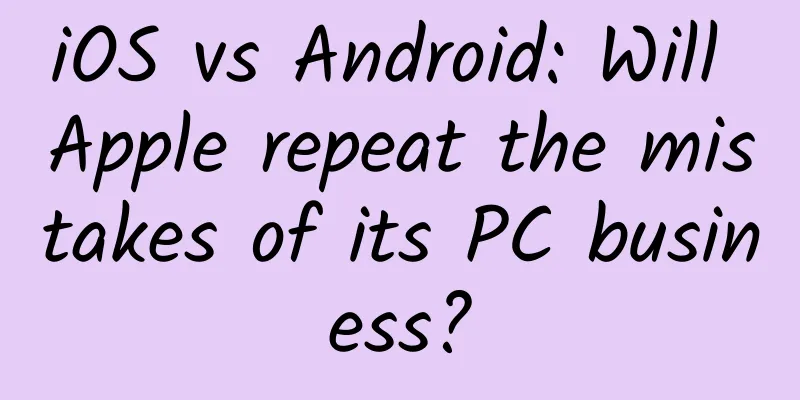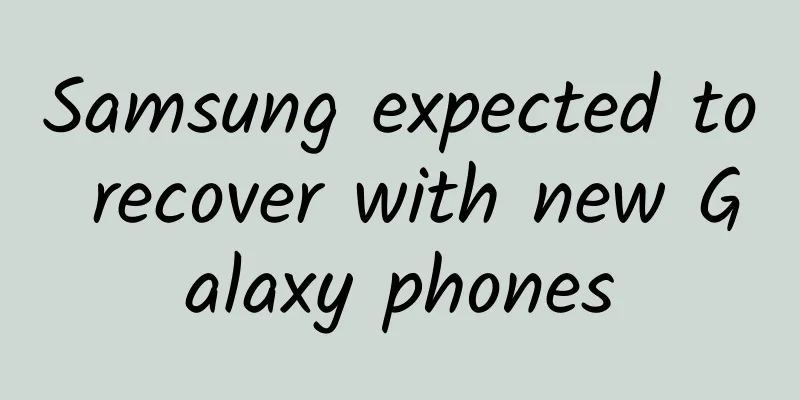iOS vs Android: Will Apple repeat the mistakes of its PC business?

|
Since its birth, the iPhone has attracted countless people with its revolutionary design and excellent experience, and has successfully established Apple's position in the mobile phone industry. However, as the smartphone industry becomes more mature, Android phones have given users more choices in terms of price and functional experience, which reminds me of the time when Apple lost to Microsoft in the PC market. I believe that many people now have such a question in their minds: Will Apple's mobile phone business follow the old path of its PC business and lose to its new rival Google's Android?
● Narrowing the gap in user experience Compared with Android, the biggest advantage of iOS is the user experience. The closed iOS system was quite advantageous in the early days of smartphone development. Its high-quality app store, complete system functions, smooth system optimization, and user-friendly interactive design are its biggest features, which are also advantages that Android in the early days and even now cannot surpass. The biggest advantage of the earliest Android is open source, and the benefits of open source are freedom and low price. Since Google has relatively few requirements for manufacturers using the Android system, manufacturers can use its system according to their own needs and develop their own Android phones. This has also driven a large number of mobile phone manufacturers to enter the smartphone market through Android, greatly promoting the development of the smartphone industry.
For users, they can buy an Android smartphone at a lower price and experience similar functions as the iPhone. At the same time, the open software installation environment also allows users to install software more freely, and can install more free or even cracked software, greatly reducing the user's cost of use. With the continuous iteration of the system, the Android system has made great improvements in terms of ease of use, fluency and perfection. In addition, with the continuous expansion of system functions by custom manufacturers, Android even has more advantages than iOS in some aspects. From the current experience of Android 6.0 and iOS 9, the gap in user experience is very small, and the biggest difference lies in the design style of the two. ● Whoever wins the developers wins the world Apple's App Store is also a major advantage. The excellent quality of apps and the huge number of apps in the App Store have even become the reason why many users choose iPhone. In addition to the strict listing conditions of the App Store, the generous profit dividends have attracted many app developers and also made the current Apple App Store a success. In June of this year, Apple increased the previous 70% developer share to 70%+ in the first year and 85% thereafter, which undoubtedly further increased developers' interest in iOS development.
Shortly after that, Google also adjusted the revenue split of its own Play Store from 7:3 to 85:15, and even did not set a time limit. For early Android developers, high investment and low returns were one of the main reasons why they were not interested. An important reason for them to persist in Android application development was the prospect of the Android system, which had a huge market share. In 2014, data showed that the proportion of developers choosing Android as their primary development platform surpassed that of iOS for the first time, which also confirmed the correctness of developers choosing Android. Although the current development income of Android platform is not as good as that of Apple's iOS, according to the trend, with the increase of Android market share and the in-app purchase ability of Android users, it is only a matter of time before Android developers can match or even surpass iOS in terms of income. ● Open systems are always more popular What Apple’s mobile phone business is experiencing now seems to be following the same old path it took when it competed with Microsoft. Just as Android popularized smartphones, Microsoft's Windows is also the biggest contributor to the popularization of PCs. Whether in the PC era or the smartphone era, Apple can be regarded as the leader of that era. However, for a period of time in the 1980s, Apple's Macintosh was defeated by a large number of cheap Windows computers launched by Microsoft and IBM. Since then, Mac has become a niche product chosen by a small number of people. Android, like Windows, has an open nature. Manufacturers can develop and design products with different positioning according to their own ideas and sell them to users with different product requirements. Android phones can have low prices like Redmi and Meizu, and can also have top-level hardware configurations like Samsung S7 and Xiaomi 5; they can be comprehensive and stable like Honor 8, and can also be distinctive like Meitu phones. Compared with today's iOS products, which are not updated much, Android phones are more like a multi-faceted girl, and any side of them is enough to show fatal temptation. Android has an advantage not only in terms of hardware support, but also in the openness of the system itself. Users can choose to unlock or root their phones according to their needs, and the provider of this operation may be the phone manufacturer itself. This is simply unimaginable on today's iOS. On iOS, you also have no way to manage your data well. You can't carry your phone around like a USB flash drive to store files like an Android phone. On the other hand, the lack of interoperability between third-party applications also brings a lot of trouble to users. For example, if a user wants to use NetEase Cloud Music to play a song downloaded using QQ Music, it is impossible on an iOS device. The only choice for the user is to download the song again in NetEase Cloud Music to occupy space, provided that NetEase Cloud owns the copyright of the song. From any perspective, as their functions become more complete, open systems will be more attractive than closed systems. Summary: The latest data shows that Apple's iOS market share has dropped to 17%. The lack of innovation in several generations of iPhones has greatly reduced users' enthusiasm for buying new iPhones. Judging from the information about the iPhone 7 that has been leaked, Apple still seems to be unable to bring great surprises to consumers in terms of design and functions. Although Apple's mobile phone business is still in its prime, it is unreasonable to be overly pessimistic; but if we look at the trend, it is also possible that the iPhone business will fall to 7.4% and become a niche choice like the Mac. However, since Cook took over as Apple's CEO, Apple has begun to move in a different direction in both hardware and software. It is unknown whether Apple will open its still dominant iOS system to more manufacturers in some form in the future. Whether Apple will repeat the same mistakes in the future may just depend on one thought. |
<<: What will the VR 2.0 era be like? Five major changes may be coming
>>: A comprehensive analysis of Swift 2 error handling techniques
Recommend
Beijing urgently reminds: Don’t go out unless necessary! Please spread this rainstorm avoidance guide!
The Central Meteorological Observatory continued ...
The cold wave is coming, and some fat people are in trouble! Why is the fat on the body not resistant to freezing?
The recent drastic drop in temperature in many pa...
Link Motion Announces Strategic Investment from China AI Capital Limited and Board Adjustment
Beijing, July 19, 2018 – Link Mobility Ltd. (NYSE...
Four obstacles shatter the 5G counterattack dreams of small and medium-sized manufacturers
Smartphone sales in the first quarter were dismal...
The candlelight flickers like a dancing elf, a monologue of the Sony LSPX-S2 crystal sound tube, a desktop artwork
Ten years ago, Sony created the design concept of...
Xiaohongshu is a project that promotes products and makes money. How does Xiaohongshu make money by promoting products?
Every industry needs users, and Xiaohongshu is th...
How to write emotionally powerful copy? Here’s a must-have formula for you!
Writing copy is the most common thing done by new...
Brand promotion: Where is the entry point for offline interactive advertising?
1. The advertising industry’s thoughts and concer...
In-depth understanding of Android Studio Sync process
1. Getting to know Sync We generally understand S...
Pinduoduo's activity operation routine gameplay!
The most "showy" one in this Double Ele...
How to increase followers and promote through WeChat operations, share some super practical tips and tricks!
1. Basic ideas of WeChat operation 1. Be familiar...
Which version of iPhone 6S is the best?
iPhone 6s has been on the market for more than two...
The most seductive love poems of 2018! Take it and use it!
It is said that an experienced and excellent copy...
The truth lies in the details! 10 design details that effectively improve user experience
Hello everyone, I am Clippp. Today I will share w...









